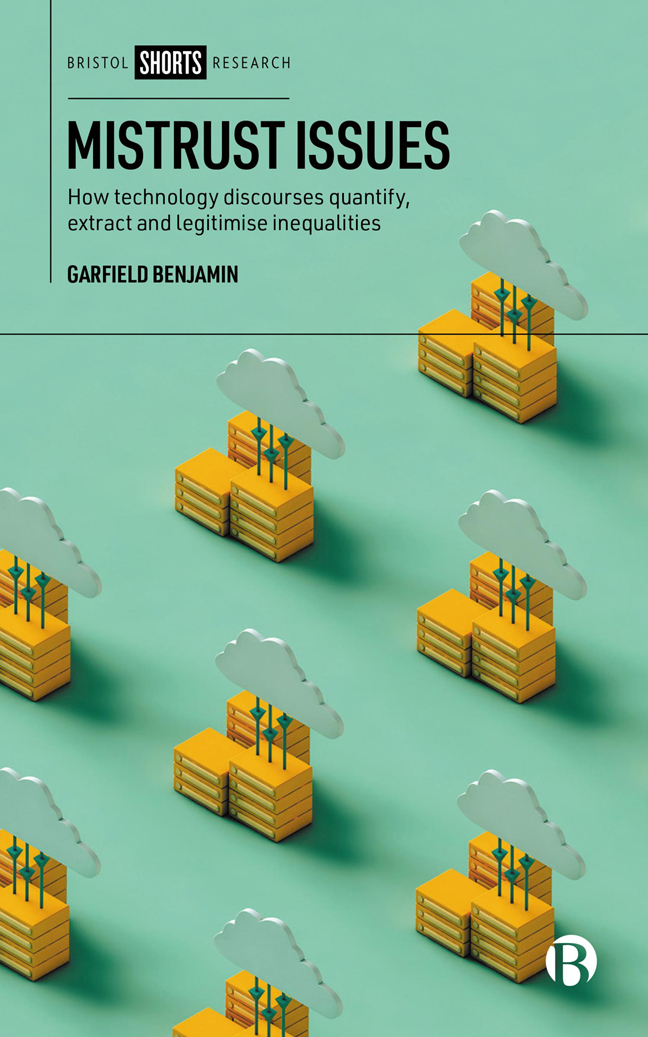Book contents
- Frontmatter
- Dedication
- Contents
- About the Author
- Acknowledgements
- One Introduction: Trust Issues
- Two Trustification: Extracting Legitimacy
- Three State: Measuring Authority
- Four Corporate: Managing Risk
- Five Research: Setting Terms
- Six Media: Telling Stories
- Seven Case Study: COVID-19 Tracing Apps
- Eight Case Study: Tech for Good
- Nine Case Study: Trusting Faces
- Ten Conclusion: False Trade-Offs
- References
- Index
Three - State: Measuring Authority
Published online by Cambridge University Press: 24 January 2024
- Frontmatter
- Dedication
- Contents
- About the Author
- Acknowledgements
- One Introduction: Trust Issues
- Two Trustification: Extracting Legitimacy
- Three State: Measuring Authority
- Four Corporate: Managing Risk
- Five Research: Setting Terms
- Six Media: Telling Stories
- Seven Case Study: COVID-19 Tracing Apps
- Eight Case Study: Tech for Good
- Nine Case Study: Trusting Faces
- Ten Conclusion: False Trade-Offs
- References
- Index
Summary
The previous chapter outlined the ways that trustification emerges. In this chapter, I apply this conceptual framework to state logics of power, and the different ways that states have trustified their populations throughout history and today. From projects of measuring through to large-scale surveillance and manipulation, states have unevenly extracted legitimacy through the use of exploitative technologies.
Trustification turns trust into a technology of power. As with many technologies, and many forms of power, trustification is not a brand-new phenomenon. Despite the representation of constant newness that technology discourses use to maintain the legitimacy of the ideology of progress, technologies tend to reflect, reify and reinforce existing social values, inequalities and injustices. So too can the underlying aims of trustification be traced backwards in time, particularly as embodied in the state.
The history of representative democracy is a precursor of trustification. This ‘indirect’ form of governance rests on measures of authority. Power slides and aggregates across social assemblages. Narratives of votes, representatives and majorities act as measures for the legitimacy of a political manifesto. Confidence and trust produce a mandate with which to exercise authority, played out with higher levels enabling more extreme policies. Games between those in or seeking power treat populations as a resource from which to extract legitimacy for that power.
It is useful to consider the mechanisms and moments in which state or representative authority breaks down, the points where the extraction of legitimacy becomes visible. Election monitors meant to prevent fraud are designed as a mechanism to support (or reject) the legitimacy of the outcome. Australia's representative democracy enforces participation as a means of extracting legitimacy for the wider system: abstention is still registered as a mark of consent; and the historical exclusion of indigenous peoples categorizes who does and does not count as the population from whom legitimacy is required. Autocratic regimes employ unfree and unfair elections to force consent from their population, falsifying measures to maintain legitimacy. Migrant populations suffer bureaucratic and now technocratic counting to ‘count’ for aid (Metcalfe and Dencik, 2019). This extracts the conditions of trust out of sheer necessity. Among those embedded within the games of power, a vote of (no) confidence quantifies even mistrust, shifting the role of trust to be operationalized as a power grab under a metricized veil of democracy between those playing the game.
- Type
- Chapter
- Information
- Mistrust IssuesHow Technology Discourses Quantify, Extract and Legitimize Inequalities, pp. 37 - 54Publisher: Bristol University PressPrint publication year: 2023

